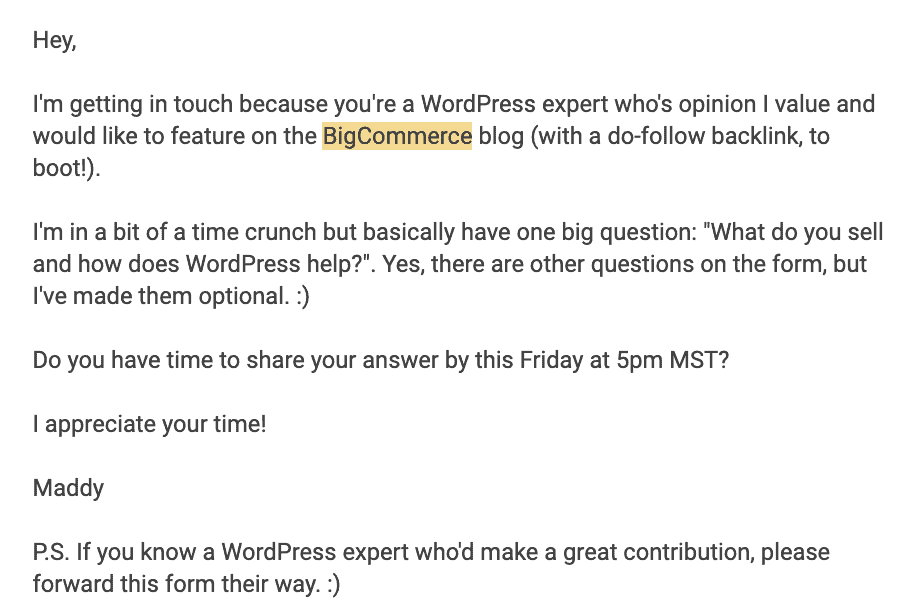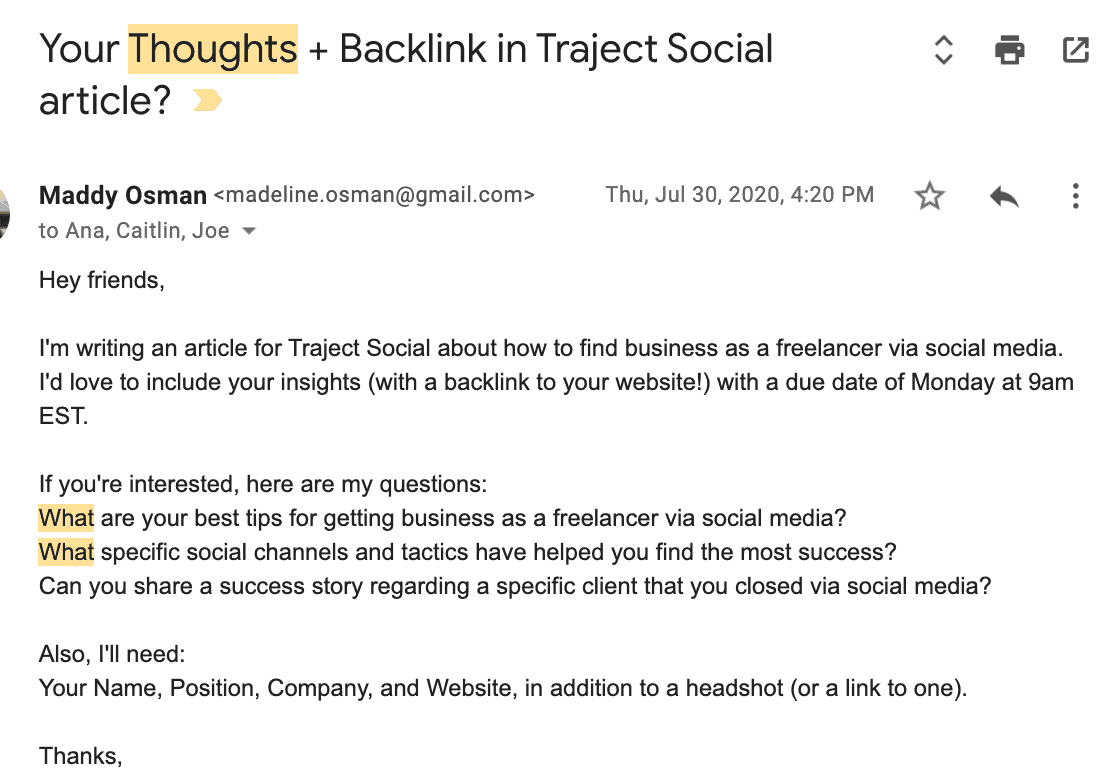One of the best ways to combat content fatigue is creating quality posts — which isn’t as easy as it sounds when you’re stuck in a creative rut.
That’s where expert roundup posts come in.
Most content marketers favor an expert roundup post because:
- It drives traffic as people like to hear from subject matter experts.
- It can help you build backlinks as your post can serve as an authentic source for other bloggers.
- It reduces the need for creative thinking on your behalf as the subject matter experts provide you with the original ideas for the post. Sean Falconer claims you only need to develop 20% of the content.
Besides that, readers receive actionable insights from expert roundup posts.
While expert roundups are excellent posts to default to when you’ve run out of creativity, they still demand a lot of work.
You need to choose the topic, identify subject matter experts, track their contact information, reach out to them, and interview the willing experts. After that, you need to find trends in their responses and translate them into actionable takeaways you can include in your post.
All this requires skill and experience. And even after all this, you need to write the final post.
In this guide, you’ll learn how to write an excellent expert roundup post
Jump Ahead to a Specific Section:
Expert Roundup 101
An expert roundup is a type of content piece that features multiple subject matter experts (SMEs) in your niche. As a host blogger or brand, you provide an interesting question or topic for discussion that makes experts want to be part of what you’re doing.
Expert roundups are also an excellent opportunity to interview a number of experts to weigh in on a popular topic, clarify aspects of a subject you’re unclear on, or get industry insights and trends.

Expert roundups are fun, can be about any topic, and bring a ton of value.
Here are some examples of expert roundup articles and e-books we at The Blogsmith have prepared for our clients:
- iPullRank – The Modern Approach to Enterprise Content Strategy (E-book on content marketing)
- MarketerHire – How to Do Your Freelance Taxes, According to 3 Pros (Freelancing and finances)
- Bluehost – Entrepreneurs Share the Best Business Advice They’ve Received (Entrepreneurship)

Benefits of an Expert Roundup
An expert roundup post is worth the extra effort of researching experts and getting their insights.
By doing an expert roundup post, you can:
Establish Yourself in Your Niche
If you’re a small business just starting, an expert roundup will help you introduce your website to your audience, thanks to the perceived association the experts lend.
By doing an expert roundup right and giving the experts a smooth working experience, you also encourage the experts to consider sharing the output to their audience and being a source again.
Increase Your Website Traffic
An expert roundup post is a helpful piece of content, which means people are more likely to share it.
According to a 2018 New York Times study on the psychology of sharing, 94% of people who share content consider whether the information they share will be helpful to the recipients.
Besides people who find your post valuable, there’s also a potential for additional views if the experts share your post with their network — which is also part of your target audience because they’re also interested in the same topics.
Make your content easy to share with suggested copy or pull quotes and a link to a live social post that the experts can repost or retweet.
QR codes are having a moment, but does your brand need to get in on it? How do you optimize your codes for conversion? We asked @graceclarke, team @Flowcode, @EmmaSHBates, @jessegenet, and @ayaabitbul for details on all things QR codes. https://t.co/gIjKureE1v
— MarketerHire (@MarketerHire) March 16, 2022
As a general rule, don’t expect experts to share your content — but be grateful if they do.
Improve Your SEO
Besides increased traffic, doing an expert roundup post helps your search engine optimization (SEO) efforts as it is an effective link-building method.
Backlinks are essential to SEO because they represent a ‘vote of confidence’ from one website to another. With expert roundup posts, you can get backlinks from experts’ About or Featured-in pages, wherein they post their contributions and interviews, or bloggers and journalists using your post as a source for their content.
Adding different expert insights to your post also improves your E-A-T (your website’s expertise, authority, and trustworthiness) score, which is a way Google determines whether you produce high-quality content valuable to readers.
The E-A-T score is incorporated in Google’s Quality Rater guidelines and is part of the algorithm (but is not considered a ranking factor).
Build Relationships
Doing an expert roundup also helps you cultivate relationships with the SMEs in your niche.
Industry experts can send you leads and more opportunities such as guest posts, referrals, and even information and insights into industry trends — if you create a good working experience with them.
How To Create an Expert Roundup
- 1. Do your research.
- 2. Ask the right questions.
- 3. Find experts.
- 4. Contact the experts.
- 5. Write your expert roundup post.
- 6. Promote the post.
1. Do Your Research.
If you have no experience doing expert research posts, check out top expert roundup posts in your niche. This will help you develop new questions and identify SMEs that have participated (or commonly participate), so you can choose who to contact for your roundup.
Here are some examples of websites with excellent expert roundup articles:
2. Ask the Right Questions.
For an excellent expert roundup post, you need to find the right topic and ask the right questions to differentiate your content from others.
You should have some ideas from your initial research, but if you don’t, these tools can help you get ideas people are interested in:
Consider ideas that offer value to the readers when thinking of roundup questions, as you would do with your keyword research process. For context, most expert roundups tackle:
- Solutions to common pain points
- Tips and tactics
- Best tools to solve a problem
When formulating a question, consider the following:
- Complex questions hardly elicit any responses, while simple topics invite too many respondents – especially when you ask questions via online tools like Help a Reporter Out (HARO).
- Niche topics are perfect for subject matter experts, but overly specific questions can limit the number of potential contributors.
- Unoriginal questions likely attract unoriginal answers or disinterested contributors.
Here’s one I sent out requesting a quote for a blog post for BigCommerce:

3. Find Experts.
A successful expert roundup post needs the right experts.
Subject matter experts can comprise a mix of bloggers, marketers, or executives. They don’t necessarily have to be influencers with large followings as long as they have enough industry expertise. You can find them in your network or even within your company.
When we work with new clients, we often ask if they have an in-house expert like a CTO or co-founder who can answer our questions about the product or industry.
I also recommend asking around your network. You can write a post on Twitter or LinkedIn or share the request on Facebook or LinkedIn groups you’re part of.
In this way, you will both attract experts and generate interest in your expert roundup post.
Hi! I’m working on a piece about B2B content marketing and how to do it successfully. I’m looking to talk to B2B content marketers about their tips for developing a strategy, and best practices for B2B marketing. Leave a reply if you're interested and I can DM you my questions!
— Afoma Umesi (@AfomaUmesi) February 23, 2022
While the internet has made it easy to look for experts, getting the right mix of people best-equipped to answer the question is harder with so many factors to consider. To narrow down your search, you can create a sample profile of your ideal respondent.
Here’s an example:
- They're directly related to the industry or niche you're writing a post for.
- They regularly share their ideas on their website or social media accounts.
- They've contributed to a roundup post in the past.
- They've worked in the industry for more than 10 years.
- They're from the U.S. (or any other desired location).
- They have a good follower base.
You can arrange the criteria according to importance. For example, if you want, you can consider an expert with more than 15 years of experience but a low follower base.
As you work with some SMEs, we advise you to build your database of experts for easy reference. That way, you won’t have a hard time the next time you need to look for experts.
4. Contact the Experts.
Now that you’ve narrowed down the list of experts you’re interested in for your post, it’s time to reach out.
Before sending an outreach email, remember that none of these experts are obligated to work with you, so craft a request that highlights what you require from them and lets them have the final say.
For example, here’s a sample email I sent to collaborators for an expert roundup post for Fanbooster:

Here are some key points to remember when writing a request email:
- Personalized — Experts receive many generic email requests. Stand out from the rest by adding personal touches, like referencing the post (where you asked for help) or congratulating them on a recent accomplishment.
- Specific — Let them know what you need, when you need it, what you expect, and what they can expect.
- Brief — Experts receive tons of emails, so get straight to the point. In the above example, besides giving them the details, I also asked for their details, including their website and headshot.
Unless the person mentioned their willingness before, don’t expect a high response rate. At the same time, don’t take a lack of response as a no. It’s often bad timing, so feel free to send a follow-up email after two to three days.
5. Write Your Expert Roundup Post.
After gathering the insights you need for your expert roundup post, it’s time to start writing your post.

Here are some tips for collaborative content creation:
- Find common themes when sorting through the responses. Group them, so it’s easier to incorporate them in the article.
- Use their quotes purposefully. Know when to paraphrase or summarize the expert’s point and when to quote them directly.
- Experiment with different formats. You can weave the quote in text, use it as a pull quote, or create an infographic. An infographic breaks the article visually and can be easily shared as quotes on social media.
- Credit the SMEs. Include their headshots, positions or titles, links to their website or social media accounts, and bios (if applicable) to make it easy for readers to grasp the value of their insights and engage with them.

6. Share the Final Result.
Once you publish your content, send the experts a link or copy via email.
Doing so shows you keep your end of the bargain and gives you the chance to subtly ask for social shares. Again, don’t be pushy.
Mae Rice from MarketerHire does this flawlessly:

You can also tweet a link to the article and tag the experts featured like below:
📙 How to Follow up on an Email (What Gurus Forgot to Mention)
— Digital Olympus (@DigitalOlympus) February 10, 2022
Awesome read by @Linkioapp! Together with 25 industry experts, @ajaypaghdal and @NickCampbelll dig deeper into controversies about follow-ups
Find out how to follow up on emails:
🔗 https://t.co/6ORiM23T0u pic.twitter.com/X8v7vlidBJ
Final Thoughts: How To Create an Expert Roundup Post
Expert roundups are valuable content whose benefits include increased traffic, improved SEO (through backlinks and expertise), and insights from industry experts.
While they require less writing and research than usual blog posts, they do involve intensive background work. Deciding on the perfect question, reaching out to experts, and piecing information together require a different kind of know-how.
Do you want to do an expert roundup post? The Blogsmith can help. Leverage our industry contacts, skills, and tools to your advantage. Get in touch today.












